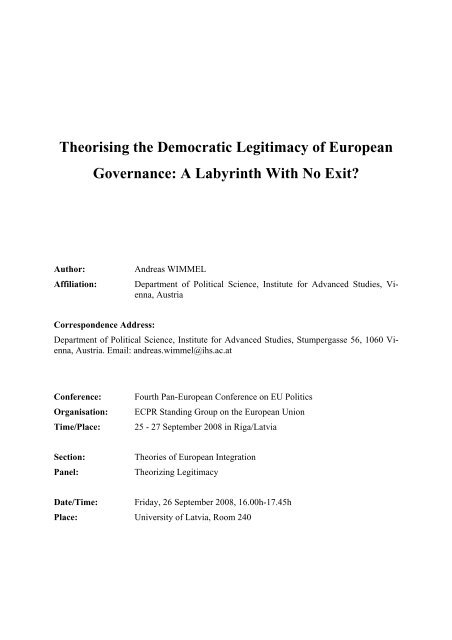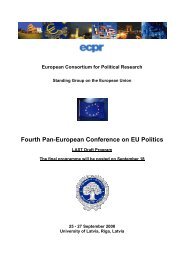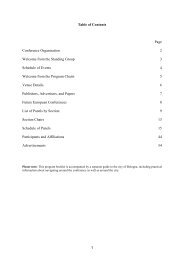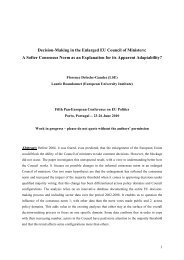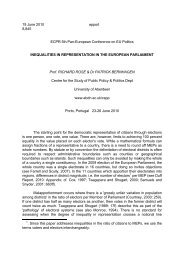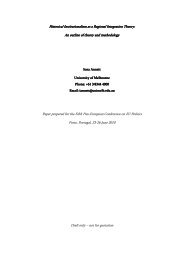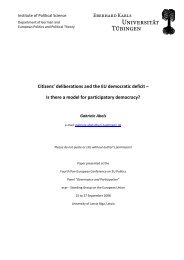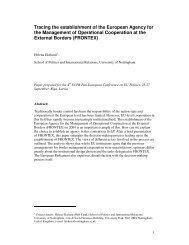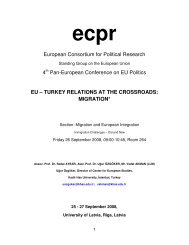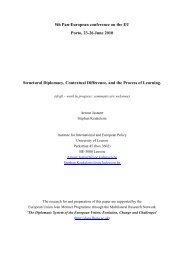Theorising the Democratic Legitimacy of European Governance
Theorising the Democratic Legitimacy of European Governance
Theorising the Democratic Legitimacy of European Governance
You also want an ePaper? Increase the reach of your titles
YUMPU automatically turns print PDFs into web optimized ePapers that Google loves.
<strong>Theorising</strong> <strong>the</strong> <strong>Democratic</strong> <strong>Legitimacy</strong> <strong>of</strong> <strong>European</strong><br />
<strong>Governance</strong>: A Labyrinth With No Exit?<br />
Author: Andreas WIMMEL<br />
Affiliation: Department <strong>of</strong> Political Science, Institute for Advanced Studies, Vienna,<br />
Austria<br />
Correspondence Address:<br />
Department <strong>of</strong> Political Science, Institute for Advanced Studies, Stumpergasse 56, 1060 Vienna,<br />
Austria. Email: andreas.wimmel@ihs.ac.at<br />
Conference: Fourth Pan-<strong>European</strong> Conference on EU Politics<br />
Organisation: ECPR Standing Group on <strong>the</strong> <strong>European</strong> Union<br />
Time/Place: 25 - 27 September 2008 in Riga/Latvia<br />
Section: Theories <strong>of</strong> <strong>European</strong> Integration<br />
Panel: Theorizing <strong>Legitimacy</strong><br />
Date/Time: Friday, 26 September 2008, 16.00h-17.45h<br />
Place: University <strong>of</strong> Latvia, Room 240
<strong>Theorising</strong> <strong>the</strong> <strong>Democratic</strong> <strong>Legitimacy</strong> <strong>of</strong> <strong>European</strong> <strong>Governance</strong>:<br />
A Labyrinth With No Exit?<br />
In recent years, <strong>the</strong> question <strong>of</strong> <strong>the</strong> legitimacy <strong>of</strong> <strong>European</strong> governance and <strong>the</strong> repercussions it has on<br />
democratic procedures in <strong>the</strong> EU member states has led to an extraordinarily intricate and controver-<br />
sial debate <strong>of</strong> which one struggles to maintain an overview. Indeed, it seems as if one is trapped in a<br />
labyrinth with no exit. This article makes an effort to disentangle <strong>the</strong> intertwined strands <strong>of</strong> <strong>the</strong>ory and<br />
to present an analytical differentiation that sheds some light on this complex maze. Taking <strong>the</strong> available<br />
categorisations into consideration, a meta-<strong>the</strong>oretical framework is developed which differentiates<br />
between particular concepts, objects, variables and standards <strong>of</strong> democratic legitimacy in <strong>the</strong> <strong>European</strong><br />
multi-level system. The result is a heuristic that should enable a more precise analysis and evaluation<br />
<strong>of</strong> democracy and legitimacy criticisms with which <strong>the</strong> <strong>European</strong> Union is increasingly confronted.<br />
Keywords<br />
<strong>European</strong> Integration, <strong>European</strong> <strong>Governance</strong>, <strong>Democratic</strong> <strong>Legitimacy</strong>, Meta<strong>the</strong>ory, Political Philosophy<br />
Introduction<br />
In an <strong>of</strong>t-quoted article, Richard Bellamy and Dario Castiglione (2003) speak <strong>of</strong> a ‘normative turn’ in<br />
<strong>European</strong> studies. They use this phrase to indicate <strong>the</strong> observation that <strong>the</strong> ongoing process <strong>of</strong> <strong>European</strong><br />
integration is increasingly confronted with criticism and appraisals exceeding <strong>the</strong> explanation or<br />
‘understanding’ <strong>of</strong> <strong>European</strong> institutions, politics, and policy areas not only in political and public debates,<br />
but also in legal, sociology, and political science treatises. The normative <strong>the</strong>ory has opened up<br />
<strong>European</strong> research as a new field <strong>of</strong> activity and began to apply classical terms, concepts, and arguments<br />
<strong>of</strong> practical philosophy for justifying (national) political systems to <strong>the</strong> <strong>European</strong> multi-level<br />
system instead <strong>of</strong> limiting itself to <strong>the</strong> empirical test <strong>of</strong> hypo<strong>the</strong>ses like <strong>the</strong> early pioneers <strong>of</strong> integration<br />
research (see <strong>the</strong> survey articles by Friese and Wagner 2002; Føllesdal 2006a). These critical discourses<br />
on Europe deal mainly with <strong>the</strong> questions <strong>of</strong> whe<strong>the</strong>r and to what extent political or legal decisions<br />
that are made between or among EU institutions are subject to democracy and/or legitimacy<br />
deficits, by which features <strong>the</strong>se deficits can be recognized or from what causes <strong>the</strong>y stem, and, if applicable,<br />
what political measures or social developments could reduce or eliminate <strong>the</strong>m (see Moravcsik<br />
2002; Føllesdal and Hix 2006; Kohler-Koch and Rittberger 2007).<br />
2
Quite rightly, Bellamy and Castiglione date <strong>the</strong> origin <strong>of</strong> <strong>the</strong> critical legitimacy and democracy debates<br />
back to <strong>the</strong> Maastricht Treaty (1992), which led to <strong>the</strong> considerable consequential, and, after years <strong>of</strong><br />
stagnation, ra<strong>the</strong>r surprising streng<strong>the</strong>ning and fur<strong>the</strong>r development <strong>of</strong> <strong>European</strong> integration. Even<br />
though <strong>the</strong> failed referendums and public protests against <strong>the</strong> ‘<strong>European</strong> Constitution’ in France and<br />
<strong>the</strong> Ne<strong>the</strong>rlands in May and June <strong>of</strong> 2005 attracted more media attention, a three-dimensional dynamic<br />
began at <strong>the</strong> latest with <strong>the</strong> Maastricht Treaty, whose interconnections must be seen as <strong>the</strong> initiation<br />
for <strong>the</strong> normative legitimacy and/or democracy debate: first, this marked <strong>the</strong> beginning <strong>of</strong> a general<br />
lowering <strong>of</strong> approval rates towards <strong>the</strong> <strong>European</strong> Union in many member states, so that <strong>the</strong> previously<br />
assumed ‘permissive consensus’ <strong>of</strong> citizens for <strong>the</strong> continuation <strong>of</strong> <strong>the</strong> <strong>European</strong> integration project<br />
began to sway more and more. Secondly, two national constitutional courts, <strong>the</strong> German Constitutional<br />
Court and <strong>the</strong> Danish Supreme Court, were appealed to a juridical review to examine whe<strong>the</strong>r <strong>the</strong> loss<br />
<strong>of</strong> national sovereignty resulting from <strong>the</strong> EC treaty is consistent with constitutional law in <strong>the</strong> respec-<br />
tive country. And thirdly, in some policy areas <strong>the</strong> way was paved for majority decisions in <strong>the</strong> Euro-<br />
pean Council and Parliament, so that at least in <strong>the</strong>ory a situation was created in which one group <strong>of</strong><br />
states could overrule ano<strong>the</strong>r (Weiler 1992).<br />
Since <strong>the</strong>n, an extraordinarily intricate and controversial debate on <strong>the</strong> legitimacy <strong>of</strong> <strong>European</strong> govern-<br />
ance has developed difficult to get an overview <strong>of</strong>. This article does not attempt to make ano<strong>the</strong>r nor-<br />
mative contribution to <strong>the</strong> diagnoses, symptoms, and <strong>the</strong>rapies <strong>of</strong> democracy and/or legitimacy deficits<br />
<strong>of</strong> <strong>the</strong> <strong>European</strong> Union (or to argue against <strong>the</strong> existence <strong>of</strong> deficits) or to launch into a critical discus-<br />
sion <strong>of</strong> existing normative positions. Instead, it concentrates on disentangling <strong>the</strong> intertwined strands<br />
<strong>of</strong> <strong>the</strong>ory and presenting an analytically comprehensive differentiation that, hopefully, can contribute<br />
at least somewhat to <strong>the</strong> illumination <strong>of</strong> <strong>the</strong> maze. Taking <strong>the</strong> available categorisations into considera-<br />
tion, a meta-<strong>the</strong>oretical framework differentiating between certain concepts, objects, variables and<br />
standards <strong>of</strong> evaluation will be developed that could interact with <strong>the</strong> political legitimacy <strong>of</strong> <strong>European</strong><br />
governance in normative and empirical interrelationships. The result is a comprehensive heuristic in-<br />
tended to lead to a differentiated and <strong>the</strong>oretically more informed analysis and assessment <strong>of</strong> democ-<br />
racy and/or legitimacy criticisms with which <strong>the</strong> <strong>European</strong> Union is increasingly confronted.<br />
1. State <strong>of</strong> Research on <strong>the</strong> Meta<strong>the</strong>ory <strong>of</strong> <strong>the</strong> EU <strong>Legitimacy</strong> Debate<br />
After initially, in particular normative assessments <strong>of</strong> <strong>the</strong> first order on <strong>the</strong> political legitimacy <strong>of</strong> Eu-<br />
ropean governance were published and discussed, <strong>the</strong>re are now a few meta-<strong>the</strong>oretical studies <strong>of</strong> <strong>the</strong><br />
second order in which <strong>the</strong> academic debate is analytically processed and systematically differentiated<br />
(see Chryssochoou 2000; Holzhacker 2007). While <strong>the</strong> disagreements about legitimacy <strong>of</strong> <strong>the</strong> Euro-<br />
pean Union had a certain creative potential and sensitised us to multi-dimensional problem solutions at<br />
first, <strong>the</strong> meta-<strong>the</strong>oretical discourse deals with sharpening concepts as well as revealing logical or in-<br />
consistent correlations and premises that <strong>of</strong>ten remained, consciously or unconsciously, in <strong>the</strong> back-<br />
ground <strong>of</strong> first order evaluations. Such a perspective could contribute to a fur<strong>the</strong>r development <strong>of</strong> <strong>the</strong><br />
3
EU legitimacy debate in as far as non-uniform and ambiguous understandings <strong>of</strong> terms are one <strong>of</strong> <strong>the</strong><br />
main reasons why entirely contrary perceptions <strong>of</strong> <strong>the</strong> political legitimacy <strong>of</strong> <strong>European</strong> governance have<br />
led to situations in which some discourse participants have at first talked “at cross-purposes”<br />
without ever getting to <strong>the</strong> core <strong>of</strong> <strong>the</strong>ir conflict. Although this meta-<strong>the</strong>oretical debate is still in its initial<br />
stages, it has quickly become apparent that <strong>the</strong> <strong>of</strong>ten quoted and now generally accepted dichotomy<br />
between input and output legitimacy by Fritz Scharpf is at least no longer sufficient to cover all<br />
conceivable forms and <strong>the</strong>oretical links between critiques <strong>of</strong> legitimacy and/or democracy that could<br />
apply to <strong>the</strong> <strong>European</strong> multi-level system. With this equally practical and simplifying differentiation, it<br />
is not possible to cover all potential sources and deficits <strong>of</strong> political legitimacy without contradictions.<br />
It <strong>of</strong>ten remains unclear whe<strong>the</strong>r and how certain objects <strong>of</strong> legitimacy are interrelated with which <strong>of</strong><br />
<strong>the</strong> two types <strong>of</strong> legitimacy, and to what extent <strong>the</strong> inter-institutional decision-making process (independent<br />
<strong>of</strong> <strong>the</strong> participation by citizens) is normatively relevant (Scharpf 1999; Moravcsik and Sangiovanni<br />
2003).<br />
Most <strong>of</strong> <strong>the</strong> existing meta-<strong>the</strong>oretical studies on <strong>the</strong> EU legitimacy debate distinguish more or less explicitly<br />
between certain categories, without making it always clear whe<strong>the</strong>r and to what extent <strong>the</strong>se<br />
differentiations are conceptually sufficient to cover all possible dimensions <strong>of</strong> EU legitimacy required<br />
for a comprehensive heuristic. Erik O. Eriksen and John Erik Fossum (2004) suggest three strategies<br />
as potential solutions for EU legitimacy problems that are derived from <strong>the</strong>oretical finality visions <strong>of</strong><br />
<strong>European</strong> integration. Each has, according to <strong>the</strong> authors, specific strengths and weaknesses. The first<br />
type understands <strong>the</strong> EU as a functional ‘problem-solving entity’, <strong>the</strong> second constructs it as a ‘valuebased<br />
community’, and <strong>the</strong> third describes it as a ‘right-based union’. These three types are differentiated<br />
especially along <strong>the</strong> ‘conceptions <strong>of</strong> rationality’ (instrumental, contextual, communicative) <strong>the</strong>y<br />
are based on, and regarding <strong>the</strong>ir ‘legitimacy mode’ (efficiency, collective self-understanding, justice<br />
and norms <strong>of</strong> fairness). By contrast, Christopher Lord and Paul Magnette (2004) differentiate between<br />
four different ‘vectors <strong>of</strong> legitimation’, which should not be understood as fully developed <strong>the</strong>ories,<br />
but ra<strong>the</strong>r as guidelines for a potential legitimacy <strong>of</strong> <strong>European</strong> governance: ‘indirect legitimacy’ means<br />
democratic legitimation that is transferred from <strong>the</strong> national level into EU institutions. ‘Parliamentary<br />
legitimacy’ considers <strong>the</strong> influence and control functions <strong>of</strong> national parliamentary bodies as well as<br />
<strong>the</strong> directly elected <strong>European</strong> Parliament in <strong>the</strong> EU decision-making process. ‘Technocratic legitimacy’<br />
is assessed by <strong>the</strong> capacity <strong>of</strong> EU institutions to solve complex and technically difficult problems<br />
for citizens efficiently and effectively. And ‘procedural legitimacy’ results from <strong>the</strong> decisionmaking<br />
process, that is from <strong>the</strong> question <strong>of</strong> how actors or institutions coordinate and make collective<br />
decisions. In addition, an input and an output variant are distinguished for each vector. Richard<br />
Bellamy and Dario Castiglione (2003) differentiate between an ‘internal’ and an ‘external’ dimension<br />
<strong>of</strong> legitimacy. The internal dimension reflects norm-based relationships between <strong>the</strong> people within political<br />
organizations, as well as to <strong>the</strong> institutions governing <strong>the</strong>ir lives. The external dimension pertains<br />
to <strong>the</strong> justification <strong>of</strong> <strong>the</strong>se institutions and <strong>the</strong>ir congruence with certain formal and substantive<br />
4
norms. Both dimensions can be referred to <strong>the</strong> legitimacy <strong>of</strong> <strong>the</strong> ‘polity’ and to <strong>the</strong> ‘regime’, whereby<br />
<strong>the</strong> polity dimension is again differentiated into political ‘subjects’ and ‘spheres’ and <strong>the</strong> regime di-<br />
mension into ‘style’ and ‘scopes’ <strong>of</strong> politics. Finally, Andreas Føllesdal (2006b), who presented <strong>the</strong><br />
most complex categorization thus far, differentiates between four basic ‘conceptions’ (legality, com-<br />
pliance, problem-solving, justifiability), four institutional ‘mechanisms’ (participation, democratic<br />
rule, actual consent, output), and six ‘objects’ (political decisions, authorities, public institutions, re-<br />
gime, regime principles, and political community) <strong>of</strong> democratic legitimation. Some <strong>of</strong> <strong>the</strong> respective<br />
sub-categories are differentiated even fur<strong>the</strong>r, for example <strong>the</strong> concept <strong>of</strong> justifiability into legal, so-<br />
cial, and normative legitimacy.<br />
These four meta-<strong>the</strong>oretical approaches obviously differ considerably from one ano<strong>the</strong>r, although most<br />
<strong>of</strong> <strong>the</strong> categories appear in slightly different form and structure in all typologies and all authors pursue<br />
<strong>the</strong> same scientific interest, namely <strong>the</strong> development <strong>of</strong> a consistent and comprehensive heuristic <strong>of</strong><br />
analysing and assessing <strong>the</strong> political legitimacy <strong>of</strong> <strong>the</strong> <strong>European</strong> Union. These differences can firstly<br />
be attributed to conceptual fuzziness, as most <strong>of</strong> <strong>the</strong> categories represent metaphysical principles<br />
whose interpretation and delimitation require considerable efforts to find precise definitions. These<br />
variations in interpretations lead to varying arrangements <strong>of</strong> terms, some <strong>of</strong> which are on <strong>the</strong> same<br />
level, but some <strong>of</strong> which can also be interpreted as partial and sub-categories and thus fall under o<strong>the</strong>r<br />
main categories. For example, while <strong>the</strong> four legitimacy vectors <strong>of</strong> Lord and Magnette are at <strong>the</strong> same<br />
level, Bellamy and Castiglione define certain main, intermediate, and sub-categories. Both conceptual<br />
structures must be argued carefully, as it can be debated ei<strong>the</strong>r why certain categories are at a certain<br />
level and do not have any sub-categories, or because it must be justified why certain categories are not<br />
on <strong>the</strong> same level and sub-categories have to be introduced. Secondly, it <strong>of</strong>ten remains unclear whe<strong>the</strong>r<br />
certain main and sub-categories form necessary conditions for <strong>the</strong> respective category or are even sufficient<br />
conditions. Necessary conditions identify certain categories as urgently needed <strong>the</strong>oretically,<br />
which may not be lacking in a complete meta-<strong>the</strong>oretical conceptual system, and sufficient conditions<br />
assert <strong>the</strong> analytical completeness <strong>of</strong> certain main and sub-categories. While Føllesdal, for example,<br />
unambiguously formulates that he has tried to present a sufficient categorization, Eriksen and Fossum<br />
leave it unclear in <strong>the</strong>ir article whe<strong>the</strong>r <strong>the</strong>ir three strategies <strong>of</strong> assessing legitimation are sufficient for<br />
a comprehensive heuristic. And thirdly, it remains <strong>of</strong>ten unclear whe<strong>the</strong>r <strong>the</strong> authors already postulate<br />
certain categories as normative conditions for a legitimate political system (and to what extent <strong>the</strong>y are<br />
deficient), or whe<strong>the</strong>r certain categories that could have normative-<strong>the</strong>oretical relations with <strong>the</strong> political<br />
legitimacy <strong>of</strong> <strong>European</strong> governance are first systematically differentiated. Both <strong>the</strong> analytical and<br />
<strong>the</strong> evaluative perspectives embody meaningful starting points for a fruitful discourse on legitimacy,<br />
however, clear disclosure and positioning would be helpful in avoiding misunderstandings. Analytical<br />
categories, which belong in a meta-<strong>the</strong>oretical conceptual system for <strong>the</strong> sake <strong>of</strong> completeness, need<br />
not also be identified as normatively necessary or even deficient. An evaluation <strong>of</strong> <strong>the</strong> individual categories,<br />
which <strong>of</strong>ten presupposes empirical knowledge, requires much more complex argumentation<br />
5
and need not necessarily be provided to justify <strong>the</strong> categories analytically. While Eriksen and Fossum<br />
disclose from <strong>the</strong> beginning that <strong>the</strong>y wish to discuss <strong>the</strong>ir three legitimation strategies mainly in a<br />
normative sense, and Føllesdal, at least in <strong>the</strong> first part <strong>of</strong> his text, attempts to avoid <strong>the</strong> use <strong>of</strong> strong<br />
judgmental terms, in <strong>the</strong> complex categorization <strong>of</strong> Bellamy and Castiglione, analytical and normative<br />
elements are mixed toge<strong>the</strong>r in an intertwined and difficult to unravel tangle <strong>of</strong> concepts.<br />
In <strong>the</strong> following sections I develop a syn<strong>the</strong>sis that tries to avoid <strong>the</strong> analytical deficits and shortcomings<br />
<strong>of</strong> <strong>the</strong>se meta-<strong>the</strong>oretical approaches. I argue that we need four main categories with three subcategories<br />
each to place <strong>the</strong> potential legitimacy problem <strong>of</strong> <strong>European</strong> governance in a <strong>the</strong>oretical<br />
framework in order to process it. First, we need a precisely defined legitimacy concept that delimits<br />
under which conditions political power is acceptable or worthy <strong>of</strong> being recognized. Secondly, we<br />
need a legitimacy object, that is, a certain political institution or a certain legal norm whose political<br />
legitimacy is to be assessed. Thirdly, a legitimacy variable must be determined on which political legitimacy<br />
depends, for example <strong>the</strong> decision-making process or certain policy outputs. And fourthly, a<br />
legitimacy standard must be formulated, against which legitimacy can be measured and judged, for<br />
example a normative ideal situation or a certain nation-state. In addition, I will argue that it is sufficient<br />
to differentiate each <strong>of</strong> <strong>the</strong>se categories in three sub-categories to cover <strong>the</strong> recently debated<br />
forms and <strong>the</strong>oretical links <strong>of</strong> legitimacy and/or democracy critiques that have been applied to <strong>the</strong><br />
multi-level system <strong>of</strong> <strong>the</strong> <strong>European</strong> Union.<br />
2. Concepts <strong>of</strong> <strong>Legitimacy</strong><br />
Under what conditions a political system can be legitimised or constraints violently implemented by a<br />
state are at times justifiable is presumably <strong>the</strong> oldest, but still <strong>the</strong> central issue <strong>of</strong> political philosophy.<br />
Referring to political legitimacy, <strong>the</strong> key question is: what are <strong>the</strong> reasons for justifying political rules<br />
in terms <strong>of</strong> generally binding decisions (cf. Barker 1990; Beetham 1991)? After <strong>the</strong> <strong>European</strong> Union<br />
developed to a supranational order that governs, i.e. makes and implements legally binding decisions<br />
<strong>of</strong> a depth and scope that were previously reserved solely for sovereign states, <strong>the</strong> question arises as to<br />
which classical legitimacy concepts retain <strong>the</strong>ir normative validity beyond national governance<br />
(Barker 2003). <strong>Legitimacy</strong> concepts formulate perceptions <strong>of</strong> whe<strong>the</strong>r and under what conditions certain<br />
legitimacy objects, such as political institutions or individual political decisions, can be assumed<br />
to be acceptable or worthy <strong>of</strong> recognition and can be justified intersubjectively and independently <strong>of</strong><br />
<strong>the</strong> own self (Rawls 1985; see also Morgan 2005). With respect to <strong>the</strong> EU, three concepts <strong>of</strong> political<br />
legitimacy have been differentiated, by which certain legitimacy objects can be subjected to a critical<br />
evaluation, namely legality, acceptance/compliance, and normative justification.<br />
Legality: The concept <strong>of</strong> legality is limited to <strong>the</strong> purely juristic issue <strong>of</strong> whe<strong>the</strong>r and to what extent<br />
positively stated legal regulations have been violated and derives <strong>the</strong> legitimacy <strong>of</strong> political systems<br />
from this assessment. Whe<strong>the</strong>r and to what extent this legal conformity exists could be dependent on<br />
<strong>the</strong> judgments <strong>of</strong> national or supranational instances such as <strong>the</strong> <strong>European</strong> Court <strong>of</strong> Justice (ECoJ), or<br />
6
on own juristic argumentation. Apparently, <strong>the</strong> long controversial idea <strong>of</strong> legal positivism, on which a<br />
philosophical discourse is still being conducted (albeit more readily comprehensible) is hidden behind<br />
this concept (Dyzenhaus 1996). Never<strong>the</strong>less, this legitimacy concept should be considered in <strong>the</strong><br />
meta-<strong>the</strong>oretical debate on <strong>the</strong> political legitimacy <strong>of</strong> <strong>the</strong> <strong>European</strong> Union, for even if <strong>the</strong> legality <strong>of</strong> a<br />
political system is not accepted as a sufficient condition for its legitimacy, <strong>the</strong> legality aspect could<br />
still possibly be one <strong>of</strong> several criteria for assessment. In connection with <strong>the</strong> <strong>European</strong> Union, two<br />
dimensions <strong>of</strong> legality can be differentiated, namely <strong>the</strong> compatibility <strong>of</strong> <strong>the</strong> primary legal basis <strong>of</strong> <strong>the</strong><br />
EG/EU treaty with national constitutional law and secondly, formal compliance with law in <strong>the</strong> legislative<br />
and executive decision-making process within and among EU institutions (Craig 1997; Lenaerts<br />
and Desomer 2002).<br />
Acceptance/compliance: The concept <strong>of</strong> acceptance/compliance is <strong>of</strong>ten called ‘belief in legitimacy’<br />
(Legitimitätsglaube) in <strong>the</strong> tradition <strong>of</strong> Max Weber (Cotterrell 1983). According to this concept, <strong>the</strong><br />
legitimacy <strong>of</strong> a political system or <strong>of</strong> individual decisions is dependent on <strong>the</strong> de facto support by <strong>the</strong><br />
citizens, which can be empirically measured. Acceptance is usually collected by attitude and opinion<br />
surveys, while compliance can be recognized in adherence to legal norms. If acceptance and/or compliance<br />
sink below a certain (hard to define) level in <strong>the</strong> population within a political space, it must be<br />
considered a legitimacy crisis, irrespective <strong>of</strong> <strong>the</strong> extent to which protests or acts <strong>of</strong> civil disobedience<br />
are normatively justified. If only this second concept is considered, political systems could definitely<br />
be viewed as legitimate, even if certain legal regulations have not been passed by legal means, as long<br />
as <strong>the</strong> citizens accept and follow <strong>the</strong>m. In <strong>the</strong> context <strong>of</strong> <strong>the</strong> <strong>European</strong> Union, it could be argued that<br />
<strong>European</strong> governance would <strong>the</strong>n suffer from a legitimacy deficit, if fewer and fewer citizens approved<br />
<strong>of</strong> <strong>the</strong>ir country’s membership in <strong>the</strong> EU, if <strong>the</strong>y did not accept EU directives implemented into<br />
national legal systems, if <strong>the</strong> participation in <strong>European</strong> elections decreased continuously, or if public<br />
resistance to EU policies or to <strong>the</strong> ‘<strong>European</strong> Constitution’ increased (Hurrelmann 2007).<br />
Normative justification: The concept <strong>of</strong> normative justification is without a doubt <strong>the</strong> most <strong>of</strong>ten used<br />
and at <strong>the</strong> same time <strong>the</strong> most controversial (with regard to concretisation) understanding <strong>of</strong> political<br />
legitimacy in <strong>the</strong> context <strong>of</strong> <strong>the</strong> EU legitimacy debate. This third sub-category does not cover an unambiguous<br />
evaluation object separate from <strong>the</strong> subject such as positive legal norms or citizens’ acceptance<br />
or compliance, but this concept is ra<strong>the</strong>r characterised by a subjective norm that must itself first<br />
be established and justified as a criterion for evaluation (Gaus 1999; Simmons 1999). Thus, legality<br />
can but must not be a part <strong>of</strong> normative justification. Classic examples are normative justifications <strong>of</strong><br />
certain understandings <strong>of</strong> democracy or substantive goods such as individual freedom or social justice<br />
that political systems must guarantee and ensure in order to be considered as legitimate. Political systems<br />
in which laws are passed according to certain procedural norms which are accepted or complied<br />
with by <strong>the</strong> majority <strong>of</strong> <strong>the</strong> population could still be illegitimate according to this concept if certain<br />
normative or substantive rights or goods are not respected or not provided by <strong>the</strong>m (Wheeler 2001).<br />
With respect to <strong>the</strong> <strong>European</strong> Union, this concept could be used to argue that <strong>European</strong> governance<br />
7
suffers from a political legitimacy deficit because <strong>the</strong> citizens’ opportunities to participate in <strong>European</strong><br />
decision-making processes are not sufficient or that <strong>the</strong> consequences <strong>of</strong> political decisions would increase<br />
social injustice, etc.<br />
These three concepts consider <strong>the</strong> most intensively discussed understandings <strong>of</strong> how political legitimacy<br />
can be defined and thoroughly analysed. The concept <strong>of</strong> legality in positive law derives <strong>the</strong> legitimacy<br />
<strong>of</strong> certain legal norms and procedures from <strong>the</strong>ir regularity and thus uses a different mode <strong>of</strong><br />
justification than <strong>the</strong> o<strong>the</strong>r two concepts. The concept <strong>of</strong> acceptance/compliance, which is <strong>of</strong>ten understood<br />
as empirical legitimacy, asks for social indicators to evaluate political systems <strong>of</strong> governing (or<br />
individual decisions) that lie beyond <strong>the</strong> observing subject itself, in particular opinion surveys, protest<br />
movements, or public debates. The concept <strong>of</strong> normative justification, on <strong>the</strong> o<strong>the</strong>r hand, assumes a<br />
subjective norm that can be justified with convincing reasons independent <strong>of</strong> social events, for example<br />
<strong>the</strong> usual demand for transparent decision-making processes. These three concepts could doubtlessly<br />
be linked: The procedural legality <strong>of</strong> legal norms could have an influence on acceptance or<br />
compliance <strong>of</strong> <strong>the</strong> citizenry, or normative criticism <strong>of</strong> legitimacy could be supported by increasing social<br />
protest movements that can only be determined empirically.<br />
3. Objects <strong>of</strong> <strong>Legitimacy</strong><br />
<strong>Legitimacy</strong> objects indicate certain empirical entities that can be subjected to a normative evaluation<br />
depending on which concept <strong>of</strong> legitimacy is chosen. While <strong>the</strong> three concepts initially define a certain<br />
understanding <strong>of</strong> political legitimacy, <strong>the</strong> objects can be analysed regarding <strong>the</strong>ir legitimacy along<br />
<strong>the</strong>se concepts. Usually, in <strong>the</strong> legitimacy debate <strong>the</strong> <strong>European</strong> Union is seen as an empirical unit,<br />
without differentiating sufficiently between various institutions and single decisions in specific policy<br />
areas. Of course, <strong>the</strong> political system <strong>of</strong> <strong>the</strong> EU may have some legitimacy deficits that cannot be reduced<br />
to subordinate units. However, it is also conceivable that we find certain deficits solely when<br />
analysing certain institutions or policy decisions, while <strong>the</strong> overall system does not provide any basis<br />
for a criticism <strong>of</strong> political legitimacy. Therefore, with regard to <strong>the</strong> <strong>European</strong> Union three object levels<br />
<strong>of</strong> political legitimacy have been differentiated that can be subjected to a critical evaluation, namely<br />
<strong>the</strong> political system <strong>of</strong> <strong>the</strong> EU (or its constitution) as a whole, individual EU institutions, and specific<br />
EU policy decisions.<br />
Political system (constitution) <strong>of</strong> <strong>the</strong> EU: Classically, legitimacy evaluations were <strong>of</strong>ten applied to political<br />
systems as a whole, for example to <strong>the</strong> opportunities for citizens to participate actively in political<br />
decisions, <strong>the</strong> more or less democratic constitution <strong>of</strong> a nation-state, or to <strong>the</strong> coordination <strong>of</strong> various<br />
institutions or levels within a federal state (see Easton 1981). In <strong>the</strong> case <strong>of</strong> this first object, criticism<br />
is not directed against individual institutions within <strong>the</strong> system or against special policy decisions,<br />
but ra<strong>the</strong>r against <strong>the</strong> construct <strong>of</strong> <strong>the</strong> political system in its entirety. Depending on <strong>the</strong> legitimacy<br />
concept, it can be discussed whe<strong>the</strong>r and why presidential systems <strong>of</strong> government are less legitimate<br />
than parliamentary democracies, to what extent direct democratic forms <strong>of</strong> participation lead<br />
8
to more political legitimacy than representative decision-making processes, or to what extent <strong>the</strong> ac-<br />
ceptance <strong>of</strong> <strong>the</strong> political system by <strong>the</strong> citizens is dependent on <strong>the</strong> type <strong>of</strong> democracy (Weale 1999;<br />
Cunnigham 2002). The debate on <strong>the</strong> political legitimacy <strong>of</strong> <strong>European</strong> governance concentrated<br />
greatly on this first object <strong>of</strong> legitimacy from <strong>the</strong> onset, in particular regarding <strong>the</strong> question <strong>of</strong> <strong>the</strong> ne-<br />
cessity <strong>of</strong> a ‘<strong>European</strong> Constitution’ and with regard to institutional reforms (Grimm 1995; Weiler<br />
1995), but also in <strong>the</strong> context <strong>of</strong> <strong>the</strong> problematic <strong>of</strong> (too) long ‘legitimacy chains’ in <strong>the</strong> complex<br />
multi-level system <strong>of</strong> <strong>the</strong> <strong>European</strong> Union (Höreth 1999; George 2005; Benz 2006).<br />
EU Institutions: A second object that can be subjected to an evaluation <strong>of</strong> legitimacy comprises <strong>the</strong> in-<br />
dividual political institutions within a (national or supranational) political system. Depending on<br />
which concept <strong>of</strong> political legitimacy is taken, in <strong>the</strong>ory, a situation is conceivable in which <strong>the</strong> politi-<br />
cal system is legitimised overall, but where some political institutions have special legitimacy deficits,<br />
perhaps because compliance with <strong>the</strong>m is refused, if <strong>the</strong>y do not adhere to applicable law, or do not<br />
enable democratic participation (if forms <strong>of</strong> increased participation are justified normatively). On <strong>the</strong><br />
o<strong>the</strong>r hand, it is just as conceivable that <strong>the</strong> political system as a whole has deficits in political legiti-<br />
macy, but that at least individual institutions are satisfactorily legitimised because <strong>the</strong>y meet certain<br />
criteria, for example by providing effective problem-solutions, or act and make decisions with a high<br />
degree <strong>of</strong> transparency. In <strong>the</strong> context <strong>of</strong> <strong>the</strong> debate on <strong>the</strong> political legitimacy <strong>of</strong> individual EU institutions,<br />
<strong>the</strong> question has been raised whe<strong>the</strong>r and to what extent decisions <strong>of</strong> <strong>the</strong> <strong>European</strong> Court <strong>of</strong><br />
Justice are accepted by <strong>the</strong> citizens (Gibson and Caldeira 1995), to what extent <strong>the</strong> policy <strong>of</strong> <strong>the</strong> <strong>European</strong><br />
Central Bank is, or should be more, democratically legitimised (Elgie 2002), and to what extent<br />
<strong>the</strong> EU Constitutional Convention was legitimised to a greater degree than previous treaty revisions by<br />
<strong>the</strong> Council <strong>of</strong> <strong>the</strong> <strong>European</strong> Union (Risse and Kleine 2007).<br />
EU policy decisions: Finally, certain policy decisions can be subjected to legitimacy evaluations as<br />
empirical units (Hanberger 2003). This third differentiation is necessary, because it cannot be concluded<br />
from <strong>the</strong> legitimacy <strong>of</strong> political systems as a whole or <strong>of</strong> individual political institutions that<br />
single policy decisions are also sufficiently legitimised according to concept and variables <strong>of</strong> legitimacy<br />
(see below). For example, procedural rules could be violated or decisions made in certain policy<br />
fields and by various institutions that infringe substantive norms such as freedom or equality rights. In<br />
addition, <strong>the</strong> situation is <strong>the</strong>oretically conceivable that for certain policy decisions o<strong>the</strong>r institutional<br />
procedures apply that could lead to different evaluations <strong>of</strong> legitimacy (McKay 2000). In <strong>the</strong> context<br />
<strong>of</strong> specific EU policy fields, one question raised was whe<strong>the</strong>r and to what extent decisions in <strong>the</strong> EU’s<br />
trade policy could be considered sufficiently legitimised (Meunier 2003), to what extent decisions <strong>of</strong><br />
<strong>the</strong> Common Foreign and Security Policy (CFSP) are subjected to democratic controls (Wagner 2006),<br />
and recently, to what extent and with which models <strong>of</strong> legitimation tax policy decisions in <strong>the</strong> Euro<br />
zone (‘Euroland’) can be justified (Collignon 2007).<br />
These three objects cover <strong>the</strong> most intensively discussed entities that were subjected to a critical<br />
evaluation in <strong>the</strong> framework <strong>of</strong> <strong>the</strong> EU debate on legitimacy. The most obvious and common object <strong>of</strong><br />
9
evaluation is <strong>the</strong> political system <strong>of</strong> <strong>the</strong> EU as a whole, usually <strong>the</strong> interplay <strong>of</strong> EU institutions and <strong>the</strong><br />
opportunities for citizens to participate in <strong>European</strong> Union politics in general. None<strong>the</strong>less, legitimacy<br />
evaluations can also be concentrated on or limited to two o<strong>the</strong>r levels that must be differentiated analytically<br />
from <strong>the</strong> political system as a whole, namely at individual EU institutions and EU policy decisions.<br />
Normative or empirical correlations between <strong>the</strong> three objects are possible. Thus, potential legitimacy<br />
deficits <strong>of</strong> specific decisions in certain policy areas (depending on concept and variables <strong>of</strong><br />
legitimacy) can be attributed to certain decision-making processes in individual EU institutions or to<br />
<strong>the</strong> entire political system <strong>of</strong> <strong>the</strong> EU. On <strong>the</strong> o<strong>the</strong>r hand, decisions in certain policy areas can be seen<br />
to have legitimacy problems even if <strong>the</strong> overall system or individual EU institutions are sufficiently<br />
democratically legitimised, for example because <strong>the</strong>y do not comply with certain substantive norms<br />
despite implementing a legitimate decision-making process. Fur<strong>the</strong>rmore, it can be assumed that legitimacy<br />
problems <strong>of</strong> different political objects generate different consequences (and threats) for a political<br />
system’s ability to endure.<br />
4. Variables <strong>of</strong> <strong>Legitimacy</strong><br />
<strong>Legitimacy</strong> variables are changeable factors on which, depending on <strong>the</strong> respective legitimacy concept,<br />
<strong>the</strong> evaluation <strong>of</strong> democratic legitimacy can be made dependent. Depending on <strong>the</strong> extent to<br />
which an object <strong>of</strong> legitimacy, for example a political institution, complies with a certain variable, it<br />
can be evaluated as being more or less legitimised. While <strong>the</strong> three concepts <strong>of</strong> legitimacy vary with<br />
respect to <strong>the</strong> justification mode and <strong>the</strong> three objects <strong>of</strong> legitimacy must be understood as objects that<br />
can be subjected to a legitimacy evaluation, <strong>the</strong> legitimacy variables provide quasi-independent parameters.<br />
They do not <strong>the</strong>mselves formulate any ideas whose argumentation mode could be used to<br />
justify <strong>the</strong> (democratic) legitimacy <strong>of</strong> political institutions or individual decisions, but are instead pathways<br />
along which legitimacy sources or deficits can be sought – <strong>the</strong>refore, all three concepts and<br />
objects can <strong>the</strong>oretically be combined with independent variables. With respect to <strong>the</strong> <strong>European</strong> Union,<br />
three variables <strong>of</strong> political legitimacy can be distinguished on which <strong>the</strong> legitimacy <strong>of</strong> certain objects<br />
could be made dependent, namely participation (input), process (throughput), and results (output).<br />
Participation (Input): Participation is <strong>the</strong> oldest and most intensively discussed variable on which <strong>the</strong><br />
democratic legitimacy <strong>of</strong> political systems can be made dependent. It looks for direct and indirect opportunities<br />
for citizens to influence policies or for <strong>the</strong>ir possibilities <strong>of</strong> actively participating in <strong>the</strong> political<br />
decision-making process (see Lijphart 1994; Dahl 2000). This variable thus concerns <strong>the</strong> civil<br />
and socio-cultural principles <strong>of</strong> democratic politics and covers <strong>the</strong> first phase <strong>of</strong> <strong>the</strong> political process<br />
up to <strong>the</strong> formulation <strong>of</strong> policies by elected representatives. On <strong>the</strong> one hand, <strong>the</strong> extent to which <strong>the</strong><br />
citizens are allowed to participate in free, fair, and secret elections, to what extent <strong>the</strong>y have internalised<br />
a collective identity, or to what extent <strong>the</strong>y take part in decision-making by direct democratic<br />
means could be used in <strong>the</strong> evaluation, depending on which model <strong>of</strong> political legitimacy was previ-<br />
10
ously normatively justified. For example, many scholars have argued that a reliable collective identity<br />
is a precondition for legitimate democratic procedures, above all, for majority decisions. On <strong>the</strong> o<strong>the</strong>r<br />
hand, <strong>the</strong> chances <strong>of</strong> being elected oneself in order to <strong>the</strong>n take active part in <strong>the</strong> decision-making<br />
process can be assessed. Many <strong>of</strong> <strong>the</strong>se issues have already been broadly discussed in <strong>the</strong> EU context,<br />
for example <strong>the</strong> role <strong>of</strong> referendums (Abromeit 1998; Zürn 2000), <strong>the</strong> necessity <strong>of</strong> a <strong>European</strong> public<br />
sphere and identity in terms <strong>of</strong> a Volksgemeinschaft (Eriksen 2005; Peters 2005), or <strong>the</strong> inclusion <strong>of</strong><br />
civil society and social movements in EU politics (Smismans 2003; Della Porta 2005).<br />
Process (Throughput): The second variable on which <strong>the</strong> legitimacy <strong>of</strong> political systems can be made<br />
dependent is <strong>the</strong> institutional decision-making process. After <strong>the</strong> citizens have exhausted <strong>the</strong>ir direct or<br />
indirect opportunities for participation and have usually delegated <strong>the</strong>ir preferences, representatives or<br />
lobbyists enter <strong>the</strong> political scene that negotiate and decide in <strong>the</strong> complex arrangement <strong>of</strong> institutional<br />
procedures (Baird 2001). With respect to <strong>the</strong> <strong>European</strong> Union, in this second phase political legitimacy<br />
is dependent on <strong>the</strong> procedural mechanisms <strong>of</strong> decision-making in <strong>the</strong> <strong>European</strong> multi-level system,<br />
within individual EU institutions and vertically between various EU institutions as well as horizontally<br />
among <strong>the</strong> national levels and <strong>the</strong> <strong>European</strong> level (Benz 2006). Depending on which concept <strong>of</strong> political<br />
legitimacy is selected, certain legislative processes within or among various levels in <strong>the</strong> political<br />
system <strong>of</strong> <strong>the</strong> EU could be more or less (democratically) legitimised. In <strong>the</strong> context <strong>of</strong> <strong>the</strong> EU legitimacy<br />
debate it has been discussed, for example, to what extent national parliaments should be more<br />
integrated into legislative processes (Neunrei<strong>the</strong>r 1994), to what extent transparency in <strong>the</strong> decisionmaking<br />
processes and access to information play a role (Héritier 2003), and to what extent argumentative<br />
deliberations in commissions and committees could increase <strong>the</strong> democratic legitimacy <strong>of</strong> <strong>European</strong><br />
governance (Eriksen and Fossum 2002; Neyer 2003).<br />
Results (Output): The last variable makes <strong>the</strong> democratic legitimacy <strong>of</strong> a political system dependent on<br />
<strong>the</strong> quality <strong>of</strong> its results; that is on <strong>the</strong> decisions made and <strong>the</strong>ir consequences resulting from <strong>the</strong> political<br />
process. For this variable, <strong>the</strong> decisive factor is not <strong>the</strong> extent to which citizens are involved in<br />
policies (input) or how <strong>the</strong> institutional decision-making process functions (throughput), but ra<strong>the</strong>r <strong>the</strong><br />
quality <strong>of</strong> <strong>the</strong> final results and balances (output). Which features should be used to evaluate <strong>the</strong> quality<br />
<strong>of</strong> political results is a purely normative issue that need not necessarily have a correlation with <strong>the</strong><br />
o<strong>the</strong>r two variables <strong>of</strong> legitimacy. Performance criteria are state guarantees <strong>of</strong> <strong>the</strong> rule <strong>of</strong> law and security,<br />
<strong>the</strong> creation <strong>of</strong> permanent peace and economic growth, <strong>the</strong> compatibility <strong>of</strong> policies with welfare<br />
or social justice, as well as especially <strong>the</strong> efficiency or effectiveness <strong>of</strong> regulations and problemsolving<br />
(Scharpf 1997; Majone 1999). It has been argued in <strong>the</strong> context <strong>of</strong> <strong>the</strong> legitimacy debate that<br />
EU policy-making can and must be best legitimised by its results, because <strong>the</strong> socio-cultural and institutional<br />
preconditions for sustainable input legitimacy had not yet been sufficiently established at <strong>the</strong><br />
<strong>European</strong> level (Scharpf 2003). O<strong>the</strong>rs have expressed fundamental doubts as to whe<strong>the</strong>r <strong>European</strong><br />
governance can be legitimised ‘post-parliamentary’ by <strong>the</strong> results <strong>of</strong> its policy-making, because <strong>the</strong><br />
11
‘general will’ (volonté générale) <strong>of</strong> <strong>the</strong> people can be defined only by <strong>the</strong> process <strong>of</strong> democratic par-<br />
ticipation (Lord and Beetham 2001).<br />
These variables cover three <strong>of</strong> <strong>the</strong> most intensively discussed factors on which <strong>the</strong> political legitimacy<br />
<strong>of</strong> <strong>European</strong> governance could be made dependent. The participation variable deals with <strong>the</strong> opportunities<br />
<strong>of</strong> citizens to participate in <strong>the</strong> political process and <strong>the</strong> socio-cultural premises <strong>of</strong> democratic<br />
policy-making. The process variable starts when citizens have delegated <strong>the</strong>ir interests and deals with<br />
<strong>the</strong> institutional decision-making process, depending on <strong>the</strong> object <strong>of</strong> legitimacy ei<strong>the</strong>r within a political<br />
system or in individual EU institutions, and ends when political results are available. Then <strong>the</strong> result<br />
variable sets in, with which <strong>the</strong> outputs ensuing from <strong>the</strong> political process and <strong>the</strong>ir consequences<br />
can be evaluated, ins<strong>of</strong>ar as <strong>the</strong>y can be justified as criteria for legitimacy. Here again, <strong>the</strong> three variables<br />
can be interconnected. For example, it is conceivable that <strong>the</strong> quality <strong>of</strong> political results (however<br />
<strong>the</strong>y may be defined) is dependent on citizen participation. Simultaneously however, a situation<br />
could arise in which no legitimate democratic results ensue from changed participation opportunities,<br />
depending on <strong>the</strong> legitimacy concept, as <strong>the</strong>se results depend mainly on <strong>the</strong> process variable. Normative<br />
demands for improving <strong>the</strong> political legitimacy <strong>of</strong> <strong>the</strong> EU can <strong>the</strong>n be derived from <strong>the</strong> empirical<br />
confirmation or refutation <strong>of</strong> <strong>the</strong>se assumptions.<br />
5. Standards <strong>of</strong> <strong>Legitimacy</strong><br />
Not only in <strong>the</strong> comparative research <strong>of</strong> democracies, but in <strong>the</strong> evaluation <strong>of</strong> <strong>the</strong> political legitimacy<br />
<strong>of</strong> <strong>European</strong> governance as well, a decisive role is played by <strong>the</strong> classic issue <strong>of</strong> what features distinguish<br />
legitimate political systems from o<strong>the</strong>r forms <strong>of</strong> governing, or when a political system can be<br />
said to be democratic. According to Giandomenico Majone, <strong>the</strong> whole debate about <strong>the</strong> deficit in<br />
<strong>European</strong> democracy is solely about <strong>the</strong> evaluation standards with which <strong>the</strong> EU is confronted: <strong>the</strong><br />
higher <strong>the</strong> standard <strong>of</strong> democracy is set, <strong>the</strong> greater <strong>the</strong> legitimacy deficit <strong>of</strong> <strong>the</strong> EU appears. And precisely<br />
because <strong>the</strong> question <strong>of</strong> which understanding <strong>of</strong> democracy is appropriate for <strong>European</strong> policy is<br />
so controversial in <strong>the</strong> debate on <strong>the</strong> legitimacy <strong>of</strong> <strong>the</strong> EU, <strong>the</strong> basis used for assessing <strong>the</strong> normative<br />
evaluation should always be precisely defined and justified (Majone 1998; Lord 2007). With respect to<br />
<strong>the</strong> <strong>European</strong> Union, three standards by which <strong>the</strong> political legitimacy <strong>of</strong> certain objects along <strong>the</strong><br />
three variables could be evaluated have been distinguished, namely counterfactual ideal-types, nationstates,<br />
and o<strong>the</strong>r international organisations.<br />
Counterfactual ideal-types: From its very inception, political philosophy developed counterfactual<br />
conceptions <strong>of</strong> ideal forms <strong>of</strong> legitimate governance, without any <strong>of</strong> <strong>the</strong>se ideas ever finding expression<br />
in <strong>the</strong> real world <strong>of</strong> states. Most important is first <strong>the</strong> establishment <strong>of</strong> a normative model that<br />
must prove itself in <strong>the</strong>oretic discourses, and less <strong>the</strong> empirical analysis <strong>of</strong> practical opportunities or<br />
barriers for realisation, as for example in <strong>the</strong> intensely discussed question <strong>of</strong> <strong>the</strong> normative value <strong>of</strong><br />
‘deliberative’ democracy and <strong>the</strong> public sphere (Bohman 1996; Fishkin 1997). Especially in <strong>the</strong> early<br />
stages <strong>of</strong> <strong>the</strong> debate on <strong>the</strong> political legitimacy <strong>of</strong> <strong>European</strong> governance, normative evaluations were<br />
12
<strong>of</strong>ten formulated that were based on counterfactual ideal-types and thus usually presented diagnoses <strong>of</strong><br />
deficits with no basis for comparison. This first legitimacy standard <strong>of</strong>ten masks <strong>the</strong> critical position<br />
that <strong>the</strong> political system <strong>of</strong> <strong>the</strong> EU as a whole or individual decisions do not have sufficient political<br />
legitimacy, even if <strong>the</strong>ir political legitimacy is in no way inferior compared to nation-states or o<strong>the</strong>r<br />
national organisations. Depending on <strong>the</strong> legitimacy concept applied and <strong>the</strong> variables considered, <strong>the</strong><br />
basis for comparison could be so lacking that even a positive comparison for <strong>the</strong> <strong>European</strong> Union<br />
would not give it sufficient political legitimacy, so that only a counterfactual ideal-type would provide<br />
a meaningful standard for evaluation (Dobson 2006).<br />
Nation-states: Various models <strong>of</strong> actually existing democratic nation-states provide a second potential<br />
standard for <strong>the</strong> evaluation <strong>of</strong> various objects <strong>of</strong> legitimacy in <strong>the</strong> EU. It is well known that <strong>the</strong> great<br />
majority <strong>of</strong> classic <strong>the</strong>ories <strong>of</strong> political legitimacy had <strong>the</strong> sovereign and territorially defined nationstate<br />
in mind when searching for normatively sustainable and thus legitimate forms <strong>of</strong> government.<br />
With <strong>the</strong> creation and rise to power <strong>of</strong> supranational systems <strong>of</strong> governance, initially <strong>the</strong> <strong>European</strong> Union,<br />
<strong>the</strong> issue increasingly arose <strong>of</strong> whe<strong>the</strong>r and to what extent national democracies can or should be<br />
interpreted as normative benchmarks or even as ideals for <strong>the</strong> construction <strong>of</strong> international organisations,<br />
in particular with respect to a complete parliamentarisation beyond <strong>the</strong> nation-state (Coultrap<br />
1999; Lord 2001). This problem has still not been solved, for although <strong>the</strong> EU assumes some functions<br />
<strong>of</strong> <strong>the</strong> state in some policy areas, it is not a nation-state for several reasons. Regardless <strong>of</strong> this normative<br />
dispute about appropriate standards <strong>of</strong> evaluation, various attempts have been made to apply diverse<br />
nation-state criteria for democracy to certain areas <strong>of</strong> policy-making, such as merger control,<br />
which are almost entirely communitarised in <strong>the</strong> EU, in order to compare <strong>the</strong>m with practices in non-<br />
EU countries, and also to measure <strong>the</strong> political legitimacy <strong>of</strong> <strong>the</strong> governing system <strong>of</strong> <strong>the</strong> EU as a<br />
whole against various models <strong>of</strong> national democracy (Zweifel 2003; Moravcsik 2004).<br />
O<strong>the</strong>r international organisations: Finally, o<strong>the</strong>r international organisations such as <strong>the</strong> United Nations,<br />
<strong>the</strong> WTO, or <strong>the</strong> NATO could serve as a comparison against which <strong>the</strong> political legitimacy <strong>of</strong><br />
<strong>the</strong> EU could be evaluated. It is not only <strong>the</strong> <strong>European</strong> Union that now assumes many governance<br />
functions that at times have a significant and lasting effect at <strong>the</strong> national level, also in o<strong>the</strong>r international<br />
organisations or o<strong>the</strong>r international events (such as <strong>the</strong> G8 summits), decisions are made that are<br />
passed by <strong>the</strong> national executive bodies outside <strong>of</strong> <strong>the</strong> local democratic process, and that thus <strong>of</strong>ten<br />
give rise to public protest (Zürn 2004; Buchanan and Keohane 2006). The question <strong>of</strong> whe<strong>the</strong>r and to<br />
what extent international organisations or international relations between states in general struggle<br />
with <strong>the</strong> problem <strong>of</strong> legitimacy and how <strong>the</strong>y might be democratised affects all international negotiating<br />
arrangements in <strong>the</strong> broadest sense, in which national government representatives make more or<br />
less binding decisions without referring to national democratic control (Dahl 1999; Hurd 1999; Steffek<br />
2003). At <strong>the</strong> same time it must be taken into consideration that <strong>the</strong>re is probably no o<strong>the</strong>r international<br />
organisation that is institutionalised to such a supranational degree and which has such extensive<br />
decision-making and legislative competencies as <strong>the</strong> <strong>European</strong> Union. Never<strong>the</strong>less, o<strong>the</strong>r interna-<br />
13
tional organisations provide a possible legitimacy standard that has already been implemented in di-<br />
verse empirical comparative studies (see e.g. Zweifel 2006).<br />
We have three possible standards for evaluating <strong>the</strong> political legitimacy <strong>of</strong> <strong>European</strong> governance that<br />
could bear up to normative defence. Counterfactual ideal-types develop certain standards independent<br />
<strong>of</strong> actual existing political orders that systems <strong>of</strong> government would have to comply with to be consid-<br />
ered (democratically) legitimate. Nation-states present an empirical criterion with which political<br />
multi-level systems such as <strong>the</strong> <strong>European</strong> Union could <strong>the</strong>oretically be compared, while o<strong>the</strong>r interna-<br />
tional organisations provide a third legitimacy standard. If a very sophisticated understanding <strong>of</strong> de-<br />
mocracy is normatively justified and <strong>the</strong> participation variable is used as a legitimacy concept, a negative<br />
finding would be no surprise if, for example, a stable national democracy with direct democratic<br />
elements such as Switzerland is used as a standard for evaluation. By contrast, a positive result could<br />
be anticipated if acceptance or compliance were used as a concept that included <strong>the</strong> participation or<br />
output variable and this was compared with international events such as <strong>the</strong> controversial G8 summit<br />
that <strong>of</strong>ten elicit strong public protests. Consequently, whe<strong>the</strong>r we should compare <strong>the</strong> EU with nationstates<br />
or international organisations is not a question <strong>of</strong> legitimacy concepts and variables, but ra<strong>the</strong>r a<br />
question <strong>of</strong> what <strong>the</strong> <strong>European</strong> Union is and how we see it compared to well-known political structures.<br />
6. Conclusion and prospect<br />
The ‘normative turn’ in <strong>European</strong> studies introduced an intense debate on <strong>the</strong> basis for legitimacy <strong>of</strong><br />
supranational governance within <strong>the</strong> <strong>European</strong> Union, which has now reached a significant and <strong>of</strong>ten<br />
underestimated degree <strong>of</strong> internal complexity. Taking <strong>the</strong> available categorisations into consideration,<br />
this article has made an effort to disentangle <strong>the</strong> intertwined strands <strong>of</strong> <strong>the</strong>ory and to present an analytically<br />
comprehensive heuristic. The result is an analytical instrument that differentiates between<br />
three concepts, objects, variables, and evaluation standards <strong>of</strong> political legitimacy in <strong>the</strong> <strong>European</strong><br />
multi-level system. In doing so, my aim was not to analyse <strong>the</strong> normative values <strong>of</strong> <strong>the</strong> individual<br />
categories and weigh <strong>the</strong>m against each o<strong>the</strong>r, nor was it to evaluate <strong>the</strong> degree <strong>of</strong> (democratic) legitimacy<br />
<strong>of</strong> <strong>European</strong> governance along <strong>the</strong>se differentiations. Instead, <strong>the</strong> significance and innovative<br />
contribution <strong>of</strong> this article to <strong>the</strong> field is based on <strong>the</strong> assumption that this meta-<strong>the</strong>oretical heuristic is<br />
first treated exhaustively, and secondly, is uncontroversial in <strong>the</strong> sense that it sufficiently and consistently<br />
covers all democracy and/or legitimacy evaluations that have been applied to <strong>the</strong> <strong>European</strong> Union<br />
as an organisation. Accordingly, one <strong>of</strong> <strong>the</strong> next steps <strong>of</strong> reasoning is to discuss <strong>the</strong> interrelationships<br />
between <strong>the</strong> four main categories and to examine possible linkages and combinations. For instance,<br />
normative justifications (as a concept <strong>of</strong> legitimacy) might be applied more reasonably to questions<br />
<strong>of</strong> participation issues than to policy results, and <strong>the</strong> standard <strong>of</strong> legitimacy <strong>the</strong>y develop may<br />
more likely be one <strong>of</strong> <strong>the</strong> counterfactual ideal-types than ano<strong>the</strong>r international organisation, but to argue<br />
this in detail requires a longer and more in-depth analysis.<br />
14
Tab. 1: Categories to evaluate <strong>the</strong> political legitimacy <strong>of</strong> <strong>European</strong> governance<br />
I. Concepts <strong>of</strong> <strong>Legitimacy</strong> II. Objects <strong>of</strong> <strong>Legitimacy</strong> III. Variables <strong>of</strong> <strong>Legitimacy</strong> IV. Standards <strong>of</strong> <strong>Legitimacy</strong><br />
I.1 Legality II.1 Political system <strong>of</strong> <strong>the</strong> EU III.1 Participation (Input) IV.1 Counterfactual ideal-type<br />
I.2 Acceptance/compliance II.2 EU institutions III.2 Process (Throughput) IV.2 Nation-states<br />
I.3 Normative justification II.3 EU policy decisions III.3 Results (Output) IV.3 Internat. Organisation<br />
Table 1 summarises <strong>the</strong> four categories and <strong>the</strong>ir three subcategories on <strong>the</strong> evaluation <strong>of</strong> <strong>the</strong> political<br />
legitimacy <strong>of</strong> <strong>European</strong> governance. Following a short reconstruction <strong>of</strong> <strong>the</strong> partially disparate and in-<br />
consistent level <strong>of</strong> research on <strong>the</strong> meta-<strong>the</strong>ory <strong>of</strong> <strong>the</strong> EU legitimacy debate, initially three potential le-<br />
gitimacy concepts with which political power could be justified as acceptable or worthy <strong>of</strong> recognition<br />
are defined and delimited, namely legality, acceptance/compliance, or normative justification. Sec-<br />
ondly, three objects are distinguished whose legitimacy can be evaluated, namely, <strong>the</strong> political system<br />
(or constitution) <strong>of</strong> <strong>the</strong> EU as a whole, individual EU institutions, or special EU policy decisions.<br />
Thirdly, three legitimacy variables on which political legitimacy can be made dependent were deter-<br />
mined, namely participation (input), process (throughput), or results (output). And fourthly, three<br />
possible legitimacy standards, with which <strong>the</strong> political legitimacy <strong>of</strong> <strong>the</strong> <strong>European</strong> Union can be com-<br />
pared and thus evaluated, were formulated, namely a counterfactual ideal-type, a nation-state, or an-<br />
o<strong>the</strong>r international organisation. Each section included an explanation <strong>of</strong> why <strong>the</strong>se four main catego-<br />
ries appeared necessary, what features distinguish <strong>the</strong> various sub-categories from each o<strong>the</strong>r, and why<br />
<strong>the</strong>y are potential factors <strong>of</strong> influence on normative evaluations <strong>of</strong> EU legitimacy.<br />
This categorisation provides no more, but also no less than a conceptual instrument for analysing <strong>the</strong><br />
political legitimacy <strong>of</strong> <strong>European</strong> governance. The answer to <strong>the</strong> question <strong>of</strong> whe<strong>the</strong>r and to what extent<br />
<strong>the</strong>se categories will be normatively sustainable and intersubjectively conclusive requires substantial<br />
efforts <strong>of</strong> justification and depends greatly on <strong>the</strong> combination <strong>of</strong> <strong>the</strong> individual categories. An initial<br />
analytical step would be to select at least one subcategory <strong>of</strong> each <strong>of</strong> <strong>the</strong> main categories and to justify<br />
it normatively. For example, one could attempt to argue that <strong>the</strong> political legitimacy <strong>of</strong> <strong>European</strong> governance<br />
were deficient, if <strong>the</strong> opportunities for interest groups (concept: normative justification) to<br />
participate in preparing decisions <strong>of</strong> <strong>the</strong> Council <strong>of</strong> Minister in committees (variable: process) in <strong>the</strong><br />
field <strong>of</strong> energy policy (object: policy decisions) were fewer than in France (standard: nation-state).<br />
Each <strong>of</strong> <strong>the</strong> four subcategories must be justified on its own as well as in coordination with <strong>the</strong> o<strong>the</strong>r<br />
three factors. In this case it would first be necessary to explain normatively why <strong>the</strong> participation <strong>of</strong> interest<br />
groups in preparing decisions by <strong>the</strong> Council <strong>of</strong> Ministers is an important or even necessary criterion<br />
for political legitimacy, for example by demonstrating empirically that <strong>the</strong> participation <strong>of</strong> interest<br />
groups usually leads to more efficient results. Next it would be necessary to state why this rule also<br />
applies or applies especially for decisions in <strong>the</strong> field <strong>of</strong> energy policy, and why France and no o<strong>the</strong>r<br />
country presents a suitable evaluation standard.<br />
15
Consequently, <strong>the</strong> utility <strong>of</strong> this heuristic still has to stand <strong>the</strong> test in practice, namely by taking <strong>the</strong> dif-<br />
ferent categories into consideration in <strong>the</strong> normative justification, which are not within <strong>the</strong> scope <strong>of</strong><br />
this article but which could prove to be useful in future academic and political debates. Practice would<br />
show that institutional reforms influence <strong>the</strong> democratic legitimacy <strong>of</strong> <strong>European</strong> governance in various<br />
ways, depending on which categories are chosen and defended in normative statements. Thus, this<br />
heuristic would gain a certain political relevance by directing attention to <strong>the</strong> potential influential fac-<br />
tors such as different understandings <strong>of</strong> legitimacy concepts or variables, which are <strong>of</strong>ten ignored in<br />
<strong>the</strong> politically undisputed endeavour to improve <strong>the</strong> democratic legitimacy <strong>of</strong> <strong>the</strong> EU, even though<br />
<strong>the</strong>y should be differentiated in <strong>the</strong> evaluation. For example, more decisions by majority in <strong>the</strong> Council<br />
<strong>of</strong> Ministers could certainly lead to more effective results (output), since national interests would<br />
lose influence. At <strong>the</strong> same time, <strong>the</strong> progressing reversal <strong>of</strong> <strong>the</strong> principle <strong>of</strong> unanimity could however<br />
additionally weaken <strong>the</strong> input legitimacy if <strong>the</strong> citizens had to accept EU decisions even when <strong>the</strong>ir national<br />
representatives were overruled and <strong>the</strong>y had not internalised a collective <strong>European</strong> identity that<br />
could “buffer” such losses in sovereignty. Therefore, <strong>the</strong> consequences <strong>of</strong> institutional reforms for <strong>the</strong><br />
political legitimacy <strong>of</strong> <strong>European</strong> governance should not be evaluated one-dimensionally, but should be<br />
kept in mind in light <strong>of</strong> <strong>the</strong> repercussions on o<strong>the</strong>r potential influential factors that were discussed in<br />
this article.<br />
All <strong>of</strong> <strong>the</strong>se explanations presuppose extensive expertise before a normative position that could be<br />
verified empirically using <strong>the</strong> case <strong>of</strong> <strong>the</strong> <strong>European</strong> Union could even be formulated. In addition, <strong>the</strong><br />
four main categories (and <strong>the</strong>ir three respective subcategories) not only have complex normative and<br />
empirical interrelationships with each o<strong>the</strong>r, <strong>the</strong>y also exert a reciprocal influence on each o<strong>the</strong>r. Depending<br />
on which concepts, objects, variables, and standards are chosen and applied, this decision has<br />
an immediate effect on <strong>the</strong> normative evaluation <strong>of</strong> <strong>the</strong> political legitimacy <strong>of</strong> <strong>European</strong> governance.<br />
Each <strong>of</strong> <strong>the</strong> possible combinations must lead to a different result. Thus, <strong>the</strong> ground is prepared for a<br />
political philosophy <strong>of</strong> <strong>the</strong> <strong>European</strong> Union that should give rise to a conceptually more sophisticated<br />
and more systematic analysis <strong>of</strong> a criticism <strong>of</strong> democracy and/or legitimacy. In spite <strong>of</strong> various efforts,<br />
<strong>the</strong> normative debate on <strong>the</strong> EU is still in its beginnings, since most <strong>of</strong> <strong>the</strong>se relationships and <strong>the</strong>ir<br />
mutual influences have still been only insufficiently illuminated due to a lack <strong>of</strong> empirical knowledge<br />
and <strong>of</strong>ten imprecisely defined categories. The exit from <strong>the</strong> labyrinth has indeed not yet been discovered,<br />
but hopefully this article has provided at least a few torches to light <strong>the</strong> way.<br />
16
References<br />
Abromeit, Heidrun (1998) Democracy in Europe. Legitimising Politics in a Non-state Polity (New<br />
York: Berghahn).<br />
Baird, Vanessa A. (2001) Building Institutional <strong>Legitimacy</strong>: The Role <strong>of</strong> Procedural Justice, Political<br />
Research Quarterly, 54(2), pp. 333-354.<br />
Barker, Rodney (2003) <strong>Legitimacy</strong>, Legitimation, and <strong>the</strong> <strong>European</strong> Union. What Crisis?, in: Paul P.<br />
Craig & Richard Rawlings (eds) Law and Administration in Europe. Essays in Honour <strong>of</strong> Carol<br />
Harlow, pp. 157-174 (Oxford: Oxford University Press).<br />
Barker, Rodney (1990) Political <strong>Legitimacy</strong> and <strong>the</strong> State (Oxford: Clarendon Press).<br />
Beetham, David (1991) The Legitimation <strong>of</strong> Power (Basingstoke: Macmillan).<br />
Bellamy, Richard & Castiglione, Dario (2003) Legitimizing <strong>the</strong> Euro-Polity and its Regime. The<br />
Normative Turn in EU Studies, <strong>European</strong> Journal <strong>of</strong> Political Theory, 2(1), pp. 7-34.<br />
Benz, Arthur (2006) Policy-Making and Accountability in EU Multilevel <strong>Governance</strong>, in: Arthur Benz<br />
& Yannis Papadopoulos (eds) <strong>Governance</strong> and Democracy. Comparing National, <strong>European</strong> and<br />
International Experiences, pp. 99-114 (London: Routledge).<br />
Bohman, James (1996) Public Deliberation. Pluralism, Complexity and Democracy (Cambridge,<br />
Mass: MIT Press).<br />
Buchanan, Allen & Keohane, Robert O. (2006) The <strong>Legitimacy</strong> <strong>of</strong> Global <strong>Governance</strong> Institutions,<br />
Ethics & International Affairs, 20(4), pp. 405-437.<br />
Chryssochoou, Dimitris N. (2000) Meta<strong>the</strong>ory and <strong>the</strong> Study <strong>of</strong> <strong>the</strong> <strong>European</strong> Union. Capturing <strong>the</strong><br />
Normative Turn, Journal <strong>of</strong> <strong>European</strong> Integration, 22(2), pp. 123–144.<br />
Collignon, Stefan (2007) The Three Sources <strong>of</strong> <strong>Legitimacy</strong> for <strong>European</strong> Fiscal Policy, International<br />
Political Science Review, 28(2), pp. 155-184.<br />
Cotterrell, Roger (1983) Legality and Political <strong>Legitimacy</strong> in <strong>the</strong> Sociology <strong>of</strong> Max Weber, in: David<br />
Sugarman (ed) Legality, Ideology and <strong>the</strong> State, pp. 69-94 (London: Acad. Press).<br />
Coultrap, John (1999) From Parliamentarism to Pluralism. Models <strong>of</strong> Democracy and <strong>the</strong> <strong>European</strong><br />
Union’s <strong>Democratic</strong> Deficit, Journal <strong>of</strong> Theoretical Politics, 11(1), pp. 107-135.<br />
Craig, Paul P. (1997) Democracy and Rule-making within <strong>the</strong> EC. An Empirical and Normative As-<br />
sessment, <strong>European</strong> Law Journal, 3(2), pp. 105–130.<br />
Cunningham, Frank (2002) Theories <strong>of</strong> Democracy. A Critical Introduction (London: Routledge).<br />
Dahl, Robert A. (2000) On Democracy (New Haven: Yale University Press).<br />
Dahl, Robert A. (1999) Can International Organizations be <strong>Democratic</strong>? A Sceptic’s View, in: Ian<br />
Shapiro (ed) Democracy's Edges, pp. 19-36 (Cambridge: Cambridge University Press).<br />
Della Porta, Donatella (2005) Social Movements and <strong>European</strong>isation, in: Gianfranco Bettin Lattes &<br />
Ettore Recchi (eds) Comparing <strong>European</strong> Societies. Towards a Sociology <strong>of</strong> <strong>the</strong> EU, pp. 261-286<br />
(Bologna: Monduzzi).<br />
17
Dobson, Lynn (2006) Normative Theory and Europe, International Affairs, 82(3), pp. 511-523.<br />
Dyzenhaus, David (1996) The <strong>Legitimacy</strong> <strong>of</strong> Legality, Archiv für Rechts- und Sozialphilosophie,<br />
82(3), pp. 324-360.<br />
Easton, David (1981) The Political System. An Inquiry into <strong>the</strong> State <strong>of</strong> Political Science (Chicago:<br />
Univ. <strong>of</strong> Chicago Press, 2 nd ed.).<br />
Elgie, Robert (2002) The Politics <strong>of</strong> <strong>the</strong> <strong>European</strong> Central Bank. Principal-agent Theory and <strong>the</strong> De-<br />
mocratic Deficit, Journal <strong>of</strong> <strong>European</strong> Public Policy, 9(2), pp. 186-200.<br />
Eriksen, Erik O. (2005) An Emerging <strong>European</strong> Public Sphere, <strong>European</strong> Journal <strong>of</strong> Social Theory,<br />
8(3), pp. 341-363.<br />
Eriksen, Erik O. & Fossum, John E. (2004) Europe in Search <strong>of</strong> <strong>Legitimacy</strong>. Strategies <strong>of</strong> Legitima-<br />
tion Assessed, International Political Science Review, 25(4), pp. 435-459.<br />
Eriksen, Erik O. & Fossum, John E. (2002) Democracy through Strong Publics in <strong>the</strong> <strong>European</strong> Un-<br />
ion?, Journal <strong>of</strong> Common Market Studies, 40(3), pp. 401-424.<br />
Fishkin, James S. (1997) The Voice <strong>of</strong> People. Public Opinion and Democracy (New Haven/London:<br />
Yale University Press).<br />
Føllesdal, Andreas (2006a) The <strong>Legitimacy</strong> Deficits <strong>of</strong> <strong>the</strong> <strong>European</strong> Union, Journal <strong>of</strong> Political Phi-<br />
losophy, 14(4), pp. 441-468.<br />
Føllesdal, Andreas (2006b) EU <strong>Legitimacy</strong> and Normative Political Theory, in: Michelle Cini & An-<br />
gela Bourne (eds) Palgrave Advances in <strong>European</strong> Union Studies, pp. 151-173 (Basingstoke: Pal-<br />
grave Macmillan).<br />
Føllesdal, Andreas & Hix, Simon (2006) Why There is a <strong>Democratic</strong> Deficit in <strong>the</strong> EU. A Response to<br />
Majone and Moravcsik, Journal <strong>of</strong> Common Market Studies, 44(3), pp. 533-562.<br />
Friese, Heidrun & Wagner, Peter (2002) The Nascent Political Philosophy <strong>of</strong> <strong>the</strong> <strong>European</strong> Union,<br />
Journal <strong>of</strong> Political Philosophy, 10(3), pp. 342-364.<br />
Gaus, Gerald F. (1996) Justificatory Liberalism. An Essay on Epistemology and Political Theory (New<br />
York: Oxford University Press).<br />
George, Stephen (2005) Multi-Level <strong>Governance</strong> and <strong>the</strong> <strong>European</strong> Union, in: Ian Bache & Mat<strong>the</strong>w<br />
Flinders (eds) Multi-level <strong>Governance</strong>, pp. 107-126 (Oxford: Oxford University Press).<br />
Gibson, James L. & Caldeira, Gregory A. (1995) The <strong>Legitimacy</strong> <strong>of</strong> Transnational Legal Institutions:<br />
Compliance, Support, and <strong>the</strong> <strong>European</strong> Court <strong>of</strong> Justice, American Journal <strong>of</strong> Political Science,<br />
39(2), pp. 459-489.<br />
Grimm, Dieter (1995) Does Europe Need a Constitution?, <strong>European</strong> Law Journal, 1(3), pp. 282-302.<br />
Hanberger, Anders (2003) Public Policy and <strong>Legitimacy</strong>: A Historical Policy Analysis <strong>of</strong> <strong>the</strong> Interplay<br />
<strong>of</strong> Public Policy and <strong>Legitimacy</strong>, Policy Science, 36(3), pp. 257-278.<br />
Héritier, Adrienne (2003) Composite Democracy in Europe. The Role <strong>of</strong> Transparency and Access to<br />
Information, Journal <strong>of</strong> <strong>European</strong> Public Policy, 10(5), pp. 814-833.<br />
18
Holzhacker, Ronald (2007) <strong>Democratic</strong> <strong>Legitimacy</strong> and <strong>the</strong> <strong>European</strong> Union, Journal <strong>of</strong> <strong>European</strong> In-<br />
tegration, 29(3), pp. 257-269.<br />
Höreth, Marcus (1999) No Way out for <strong>the</strong> Beast? The Unsolved <strong>Legitimacy</strong> Problem <strong>of</strong> <strong>European</strong><br />
<strong>Governance</strong>, Journal <strong>of</strong> <strong>European</strong> Public Policy, 6(2), pp. 249-268.<br />
Hurd, Ian (1999) <strong>Legitimacy</strong> and Authority in International Politics, International Organization,<br />
53(2), pp. 379-408.<br />
Hurrelmann, Achim (2007) <strong>European</strong> Democracy, <strong>the</strong> Permissive Consensus, and <strong>the</strong> Collapse <strong>of</strong> <strong>the</strong><br />
EU Constitution, <strong>European</strong> Law Journal, 13(3), pp. 343-359.<br />
Kohler-Koch, Beate & Rittberger, Berthold (2007) Debating <strong>the</strong> <strong>Democratic</strong> <strong>Legitimacy</strong> <strong>of</strong> <strong>the</strong> Euro-<br />
pean Union (Lanham, Md: Rowman & Littlefield).<br />
Lenaerts, Koen & Desomer, Marlies (2002) New Models <strong>of</strong> Constitution-Making in Europe. The<br />
Quest for <strong>Legitimacy</strong>, Common Market Law Review, 39(6), pp. 1217-1254.<br />
Lijphart, Arend (1994) Democracies: Forms, Performance, and Constitutional Engineering, <strong>European</strong><br />
Journal <strong>of</strong> Political Research, 25(1), pp. 1-18.<br />
Lord, Christopher (2007) Contested Meanings, Democracy Assessment and <strong>the</strong> <strong>European</strong> Union,<br />
Comparative <strong>European</strong> Politics, 5(1), pp. 70–86.<br />
Lord, Christopher (2001) Assessing Democracy in a Contested Polity, Journal <strong>of</strong> Common Market<br />
Studies, 39(4), pp. 641-661.<br />
Lord, Christopher & Beetham, David (2001) Legitimizing <strong>the</strong> EU. Is <strong>the</strong>re a Post-parliamentary Basis<br />
for its Legitimation?, Journal <strong>of</strong> Common Market Studies, 39(3), pp. 443-462.<br />
Lord, Christopher & Magnette, Paul (2004) E pluribus unum? Creative Disagreement about Legiti-<br />
macy in <strong>the</strong> EU, Journal <strong>of</strong> Common Market Studies, 42(1), pp. 183-202.<br />
Majone, Giandomenico (1999) The Regulatory State and Its <strong>Legitimacy</strong> Problems, West <strong>European</strong><br />
Politics, 22(1), pp. 1-24.<br />
Majone, Giandomenico (1998) Europe’s <strong>Democratic</strong> Deficit. The Question <strong>of</strong> Standards, <strong>European</strong><br />
Law Journal, 4(1), pp. 5-28.<br />
McKay, David (2000) Policy <strong>Legitimacy</strong> and Institutional Design. Comparative Lessons for <strong>the</strong> Euro-<br />
pean Union, Journal <strong>of</strong> Common Market Studies, 38(1), pp. 25-44.<br />
Meunier, Sophie (2003) Trade Policy and Political <strong>Legitimacy</strong> in <strong>the</strong> <strong>European</strong> Union, Comparative<br />
<strong>European</strong> Politics, 1(1), pp. 67-90.<br />
Moravcsik, Andrew (2004) Is <strong>the</strong>re a <strong>Democratic</strong> Deficit in World Politics? A Framework for Analy-<br />
sis, Government and Opposition, 39(2), pp. 336-363.<br />
Moravcsik, Andrew (2002) In Defence <strong>of</strong> <strong>the</strong> <strong>Democratic</strong> Deficit. Reassessing <strong>Legitimacy</strong> in <strong>the</strong> Euro-<br />
pean Union, Journal <strong>of</strong> Common Market Studies, 40(4), pp. 603-624.<br />
Moravcsik, Andrew & Sangiovanni, Andrea (2003) On Democracy and Public Interest in <strong>the</strong> Euro-<br />
pean Integration, in: Renate Mayntz & Wolfgang Streeck (eds) Die Reformierbarkeit der Demok-<br />
19
atie. Innovationen und Blockaden. Festschrift für Fritz W. Scharpf, pp. 122-148 (Frankfurt/New<br />
York: Campus Verlag).<br />
Morgan, Glyn (2005) The Idea <strong>of</strong> a <strong>European</strong> Superstate. Public Justification and <strong>European</strong> Integra-<br />
tion (Princeton, NJ: Princeton University Press).<br />
Neunrei<strong>the</strong>r, Karlheinz (1994) The <strong>Democratic</strong> Deficit <strong>of</strong> <strong>the</strong> <strong>European</strong> Union. Towards Closer Coop-<br />
eration between <strong>the</strong> <strong>European</strong> Parliament and <strong>the</strong> National Parliaments, Government and Opposi-<br />
tion, 29(3), pp. 299-314.<br />
Neyer, Jürgen (2003) Discourse and Order in <strong>the</strong> EU: A Deliberative Approach to Multi-Level Gov-<br />
ernance, Journal <strong>of</strong> Common Market Studies, 41(4), pp. 687-706.<br />
Peters, Bernhard (2005) Public Discourse, Identity, and <strong>the</strong> Problem <strong>of</strong> <strong>Democratic</strong> <strong>Legitimacy</strong>, in:<br />
Erik O. Eriksen (ed) Making <strong>the</strong> <strong>European</strong> Polity. Reflexive Integration in <strong>the</strong> EU, pp. 84-123<br />
(London: Routledge).<br />
Rawls, John (1985) Justice as Fairness. Political not Metaphysical, Philosophy and Public Affairs,<br />
14(3), pp. 223-251.<br />
Risse, Thomas & Kleine, Mareike (2007) Assessing <strong>the</strong> <strong>Legitimacy</strong> <strong>of</strong> <strong>the</strong> EUs Treaty Revision Meth-<br />
ods, Journal <strong>of</strong> Common Market Studies, 45(1), pp. 69-80.<br />
Scharpf, Fritz W. (2003) Legitimate Diversity. The New Challenge <strong>of</strong> <strong>European</strong> Integration, Zeit-<br />
schrift für Staats- und Europawissenschaften, 1(1), pp. 32-60<br />
Scharpf, Fritz W. (1999) Governing in Europe. Effective and <strong>Democratic</strong>? (Oxford: Oxfort University<br />
Press).<br />
Scharpf, Fritz W. (1997) Economic Integration, Democracy and <strong>the</strong> Welfare State, Journal <strong>of</strong> Euro-<br />
pean Public Policy, 4(1), pp. 18–36.<br />
Simmons, John A. (1999) Justification and <strong>Legitimacy</strong>, Ethics, 109(4), pp. 739-771.<br />
Smismans, Stijn (2003) <strong>European</strong> Civil Society. Shaped by Discourses and Institutional Interests,<br />
<strong>European</strong> Law Journal, 9(4), pp. 473-495.<br />
Steffek, Jens (2003) The Legitimation <strong>of</strong> International <strong>Governance</strong>: A Discourse Approach, <strong>European</strong><br />
Journal <strong>of</strong> International Relations, 9(2), pp. 249-275.<br />
Wagner, Wolfgang (2006) The <strong>Democratic</strong> Control <strong>of</strong> Military Power Europe, Journal <strong>of</strong> <strong>European</strong><br />
Public Policy, 13(2), pp. 200-216.<br />
Weale, Albert (1999) Democracy (Basingstoke: Macmillan).<br />
Weiler, Joseph H.H. (1995) Does Europe need a Constitution? Reflections on Demos, Telos and <strong>the</strong><br />
German Maastricht Decision, <strong>European</strong> Law Journal, 1(3), pp. 219-258.<br />
Weiler, Joseph H.H. (1992) After Maastricht. Community <strong>Legitimacy</strong> in Post-1992 Europe, in: Wil-<br />
liam J. Adams (ed) Singular Europe. Economy and Polity <strong>of</strong> <strong>the</strong> <strong>European</strong> Community after 1992,<br />
pp. 11-41 (Ann Arbor, MI: Univ. <strong>of</strong> Michigan Press).<br />
Wheeler, Brett R. (2001) Law and <strong>Legitimacy</strong> in <strong>the</strong> Work <strong>of</strong> Jürgen Habermas and Carl Schmitt, Eth-<br />
ics & International Affairs, 15(1), pp. 173-183.<br />
20
Zürn, Michael (2004) Global <strong>Governance</strong> and <strong>Legitimacy</strong> Problems, Government and Opposition,<br />
39(2), pp. 260-287.<br />
Zürn, Michael (2000) <strong>Democratic</strong> <strong>Governance</strong> Beyond <strong>the</strong> Nation-State. The EU and O<strong>the</strong>r Interna-<br />
tional Institutions, <strong>European</strong> Journal <strong>of</strong> International Relations, 6(2), pp. 183–221.<br />
Zweifel, Thomas D. (2006) International Organizations and Democracy. Accountability, Politics, and<br />
Power (Boulder, Colo.: Lynne Rienner).<br />
Zweifel, Thomas D. (2003) <strong>Democratic</strong> Deficits in Comparison. Best (and worst) Practices in Euro-<br />
pean, US and Swiss Merger Regulation, Journal <strong>of</strong> Common Market Studies, 41(3), pp. 541-566.<br />
21


